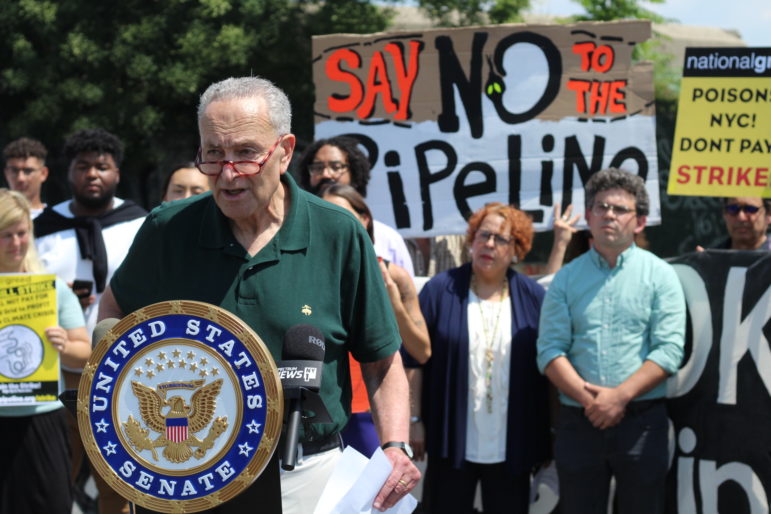The state will vote Thursday on whether to approve higher gas rates to help fund construction of the seven-mile fracked gas pipeline, which runs from Brownsville up to Greenpoint.

Liz Donovan
U.S. Senate Majority Leader Chuck Schumer joined at a Friday rally in Greenpoint opposing the National Grid North Brooklyn Pipeline Project.The state’s Department of Public Service is expected to vote Thursday on whether to hike gas rates for National Grid customers in the city—an increase that would help fund a controversial fracked gas pipeline the utility company is constructing in Brooklyn.
On Friday afternoon, U.S. Senate Majority Leader Chuck Schumer joined other legislators, community members and environmental activists in Greenpoint to express his opposition to the National Grid North Brooklyn Pipeline Project.
“There are a lot of reasons why this is a bad idea,” he said, citing both environmental justice concerns and that the new pipeline is in violation of the state’s progressive climate legislation.
The press conference, held in an industrial corner outside the National Grid facility, was in advance of the expected vote Thursday by DPS to increase the utility company’s gas rates. Construction of the seven-mile fracked gas pipeline, which runs from Brownsville up to Greenpoint, was paused in May following multiple protests by environmental justice groups.
But the state is still considering rate hikes—which National Grid estimates would increase customers’ monthly bills by $5.56 (or 3.77 percent) in the proposal’s second year and $4.89 (or 3.26 percent) in the third—would fund the work already done on the pipeline. If approved, the company would raise gas prices for its 1.9 million customers in Staten Island, Brooklyn and Southeast Queens, said Lee Ziesche, organizer with the nonprofit Sane Energy.
Ziesche learned about the pipeline in 2019 while looking through public records filed with the Department of Public Service. She, along with more than a dozen environmental groups, mobilized to protest its construction. They gained the support of City Comptroller Scott Stringer and Mayor Bill de Blasio, leading National Grid to temporarily halt the project.
But by the time the mayor came out against the pipeline in December 2019, four of the five pipeline’s sections had already been completed and begun transporting gas.
“It was really too little, too late,” said Ziesche.
Schumer declared his opposition to the project while standing among organizers Friday, claiming that the pipeline is in direct defiance of the state’s Climate Leadership and Community Protection Act (CLCPA), ambitious legislation passed in 2019 aimed at transitioning to clean energy and reducing greenhouse gas emissions.
“This law is bold in getting us to greatly, dramatically reduce the carbon, the poison, the methane, the smut that got sent into our atmosphere,” Schumer said. “This pipeline violates the precepts of the CLCPA. How can we pass a law and then let them undo the law?”
He was joined by Senator Julia Salazar, who told City Limits she’s opposed to both the pipeline and the rate hike.
“It’s unhealthy and it’s unnecessary,” she said. “Let’s not grant a rate increase for something nobody wanted in the first place.”
NY Renews, a coalition that pushed for the passage of the CLCPA, also submitted comments to the Department of Public Service saying that the rate increase “is a show of deliberate indifference to the needs of frontline communities.”
National Grid responded that it is “committed” to the city and state’s clean energy goals, and places its infrastructure in communities where it is needed most as it works toward a low-carbon energy future.
“National Grid shares Senator Schumer’s commitment to transitioning to a sustainable energy future, which we all know will not happen overnight,” said spokesperson Karen Young. “In the meantime, we have an obligation to provide energy to our two million downstate customers. The Metropolitan Reliability project, 80 percent of which has already been completed and serving customers, improves the reliability of the service that we provide while the technology required to deliver renewable energy at scale becomes more readily available and affordable.”
Some community members filed a lawsuit last March against National Grid and the New York State Department of Environmental Conversation, claiming the project will cause environmental harm to the community. Activists have also participated in a gas bill strike, withholding $66 of their gas bill, which organizers say is how much the average customer will pay in an annual increase in the second year. The groups staged another rally and march Saturday at Brooklyn Borough Hall.
Schumer accused National Grid of trying to thumb its nose at the CLCPA and noted the history of environmentally hazardous projects being built in communities of color.
“When they had to build a highway, when they had to build a pipeline, they didn’t go to communities where there was power and wealth… they went through communities of color,” he said. “That meant more asthma, that meant more particulates in the lungs. It meant more poison in the air for these people. That’s got to stop.”
Laura Miller Tomaselli, who has lived in East Williamsburg for 35 years, said that her neighborhood has a history of being an environmental dumping ground, and the pipeline is “a disaster for everyone but the people making money.”
She and her neighbors expressed frustration that a utility company would continue using fracking when more sustainable energy sources were available in neighborhoods that are already reporting high asthma rates.
“What a crazy time to build a pipeline for fracking gas,” she said. “We were so close to turning this ship around.”
Liz Donovan is a Report for America corps member.










One thought on “Activists, Chuck Schumer Protest National Grid’s Brooklyn Pipeline Ahead of Rate Hike Vote”
The Mayor and Schumer are stupid and myopic. There is a power supply shortage to the central Brooklyn/Queens area, see PSC case 14 E 0302 (Brooklyn/Queen Demand Management Program). ConEd is attempting to get more power there, but transmission lines are constrained, and there is no room to build new transmission lines in this already built-out area. No one solution is going to solve the problem. Getting more gas there to have some more generation in the form of fuel cells or cogeneration can help alleviate the constraint. Denying the pipeline construction in denying the area electricity in the summer -that is social injustice!